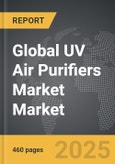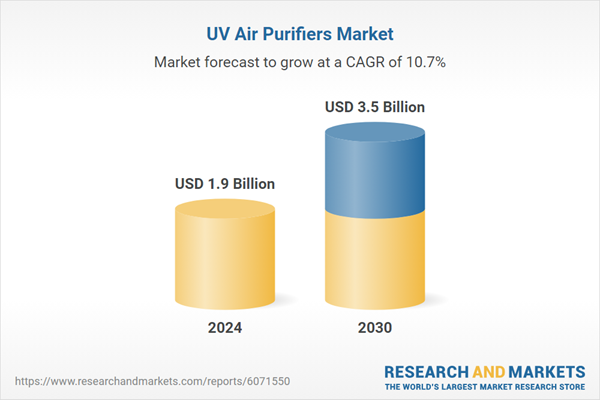Global UV Air Purifiers Market - Key Trends & Drivers Summarized
Is the Rising Demand for Pathogen-Free Air Accelerating the Use of UV Air Purifiers?
The global focus on air quality and public health has driven a sharp uptick in demand for UV air purifiers, especially in the wake of increased awareness of airborne pathogens such as viruses, bacteria, and mold spores. UV air purifiers utilize ultraviolet-C (UVC) light to inactivate or destroy microorganisms, making them highly effective for sterilizing indoor air in residential, commercial, and healthcare environments. The COVID-19 pandemic acted as a major catalyst, highlighting the importance of pathogen-free air and prompting widespread adoption of air purification solutions equipped with germicidal UV capabilities. This heightened concern over respiratory health, combined with rising pollution levels and the surge in indoor occupancy due to remote work and learning trends, has made UV air purifiers a central component of healthy building strategies. High-risk spaces such as hospitals, dental clinics, laboratories, and elder care facilities are deploying UV air systems to maintain sterile environments and reduce the risk of airborne transmission. Moreover, consumer preferences are shifting toward air purifiers that offer not just particle filtration but microbial decontamination, driving the market's pivot toward UV-based solutions as a scientifically-backed, technology-driven answer to growing air quality concerns.How Are Technological Advancements Enhancing the Safety and Efficiency of UV Air Purifiers?
UV air purifier technology has evolved significantly in recent years, with improvements that address both safety concerns and purification efficiency. Modern systems incorporate enclosed UVC chambers that prevent harmful UV radiation from escaping, making them safe for use in occupied spaces. These designs often include HEPA filtration in conjunction with UVC to offer dual-layered air purification, capturing airborne particles before UV light neutralizes biological contaminants. The incorporation of real-time air quality sensors, smart control systems, and IoT connectivity allows users to monitor performance, schedule operations, and automate purification cycles through mobile apps or integrated building management systems. Some models now use advanced photocatalytic oxidation (PCO) along with UV light to break down volatile organic compounds (VOCs) and chemical pollutants in addition to microbial threats. UVC LEDs are replacing traditional mercury lamps, offering longer life spans, lower energy consumption, and greater environmental safety. These LEDs can be fine-tuned to emit optimal wavelengths for microbial inactivation, increasing efficiency while reducing maintenance needs. Additionally, UV systems are being integrated into HVAC ducts and standalone air purifiers, giving consumers and facility managers more options for seamless implementation across a variety of spaces and applications.Can Regulatory Standards and Healthy Building Certifications Propel Market Growth?
Rising global awareness of indoor air quality and infection control is being reinforced by stricter regulations, public health guidelines, and green building certification systems, all of which are driving increased adoption of UV air purifiers. Regulatory bodies such as the U.S. Environmental Protection Agency (EPA), ASHRAE, and the World Health Organization (WHO) are emphasizing the importance of ventilation and air disinfection in mitigating airborne disease transmission. Although there are currently no universal standards specific to UV air purifiers, growing calls for regulation are prompting manufacturers to adopt higher safety and efficacy benchmarks voluntarily, including testing for microbial kill rates, ozone emissions, and radiation containment. Simultaneously, green building programs such as WELL Building Standard, LEED, and RESET are increasingly recognizing the role of advanced air purification in achieving wellness and sustainability goals. Commercial real estate developers, schools, and public infrastructure projects are adopting UV air purifiers as part of broader ESG (Environmental, Social, Governance) commitments and to meet indoor air quality thresholds necessary for certification. These external pressures and incentives are encouraging widespread implementation of UVC technologies not only in health-sensitive environments but also in office buildings, hotels, transportation hubs, and educational institutions. As health-focused design becomes a permanent feature of post-pandemic architecture, regulations and certifications will remain a key growth lever for the UV air purifier market.What Factors Are Driving Long-Term Growth in the Global UV Air Purifiers Market?
The growth in the UV air purifiers market is driven by a combination of public health priorities, technological innovation, consumer awareness, and evolving infrastructure standards. One of the primary growth drivers is the increasing prevalence of airborne diseases and allergies, which has created a sustained demand for indoor air quality solutions. The post-pandemic shift toward health-conscious lifestyles and clean indoor environments continues to influence purchasing decisions across households, commercial offices, and institutional buildings. Technological advancements - particularly in UVC LED innovation, smart integration, and multi-stage filtration systems - are making UV air purifiers more efficient, compact, and cost-effective. The growth of smart homes and connected devices is also encouraging consumers to invest in intelligent air purification solutions that can be monitored and controlled remotely. Expansion of urban centers, industrial pollution, and climate change-related impacts on air quality are further compounding the need for advanced air cleaning technologies. In addition, rising disposable incomes and increasing penetration of e-commerce platforms are improving product accessibility, particularly in developing regions. The heightened focus on workplace safety, infection control in healthcare settings, and air quality compliance in public infrastructure will continue to support commercial demand. As global attention to health, wellness, and sustainability intensifies, the UV air purifiers market is positioned for long-term expansion, fueled by innovation, regulation, and the universal desire for cleaner, safer air.Report Scope
The report analyzes the UV Air Purifiers market, presented in terms of market value (US$). The analysis covers the key segments and geographic regions outlined below:- Segments: Mounting Type (Fixed, Portable); Power (Below 70 W, 71 - 100 W, 101 W - 140 W, Above 141 W); Distribution Channel (Online, Offline); End-Use (Residential, Commercial, Industrial).
- Geographic Regions/Countries: World; United States; Canada; Japan; China; Europe (France; Germany; Italy; United Kingdom; Spain; Russia; and Rest of Europe); Asia-Pacific (Australia; India; South Korea; and Rest of Asia-Pacific); Latin America (Argentina; Brazil; Mexico; and Rest of Latin America); Middle East (Iran; Israel; Saudi Arabia; United Arab Emirates; and Rest of Middle East); and Africa.
Key Insights:
- Market Growth: Understand the significant growth trajectory of the Fixed UV Air Purifiers segment, which is expected to reach US$2.6 Billion by 2030 with a CAGR of a 11.8%. The Portable UV Air Purifiers segment is also set to grow at 7.8% CAGR over the analysis period.
- Regional Analysis: Gain insights into the U.S. market, valued at $520.1 Million in 2024, and China, forecasted to grow at an impressive 14.7% CAGR to reach $730.1 Million by 2030. Discover growth trends in other key regions, including Japan, Canada, Germany, and the Asia-Pacific.
Why You Should Buy This Report:
- Detailed Market Analysis: Access a thorough analysis of the Global UV Air Purifiers Market, covering all major geographic regions and market segments.
- Competitive Insights: Get an overview of the competitive landscape, including the market presence of major players across different geographies.
- Future Trends and Drivers: Understand the key trends and drivers shaping the future of the Global UV Air Purifiers Market.
- Actionable Insights: Benefit from actionable insights that can help you identify new revenue opportunities and make strategic business decisions.
Key Questions Answered:
- How is the Global UV Air Purifiers Market expected to evolve by 2030?
- What are the main drivers and restraints affecting the market?
- Which market segments will grow the most over the forecast period?
- How will market shares for different regions and segments change by 2030?
- Who are the leading players in the market, and what are their prospects?
Report Features:
- Comprehensive Market Data: Independent analysis of annual sales and market forecasts in US$ Million from 2024 to 2030.
- In-Depth Regional Analysis: Detailed insights into key markets, including the U.S., China, Japan, Canada, Europe, Asia-Pacific, Latin America, Middle East, and Africa.
- Company Profiles: Coverage of players such as Almazora Motors Corporation, Ashok Leyland, Daimler Truck, Dongfeng Motor Corporation, Foton Motor and more.
- Complimentary Updates: Receive free report updates for one year to keep you informed of the latest market developments.
Some of the 34 companies featured in this UV Air Purifiers market report include:
- Air Oasis LLC
- Airpura Industries
- AiroDoctor
- Austin Air Systems
- Biobase
- Coway Co., Ltd.
- Daikin Industries, Ltd.
- Eureka Forbes Limited
- Fresh-Aire UV
- Guardian Technologies LLC
- Honeywell International Inc.
- HoMedics USA
- IQAir
- Molekule
- NatéoSanté
- Panasonic Corporation
- Philips
- QleanAir Scandinavia
- Samsung Electronics
- Xiaomi Corporation
This edition integrates the latest global trade and economic shifts into comprehensive market analysis. Key updates include:
- Tariff and Trade Impact: Insights into global tariff negotiations across 180+ countries, with analysis of supply chain turbulence, sourcing disruptions, and geographic realignment. Special focus on 2025 as a pivotal year for trade tensions, including updated perspectives on the Trump-era tariffs.
- Adjusted Forecasts and Analytics: Revised global and regional market forecasts through 2030, incorporating tariff effects, economic uncertainty, and structural changes in globalization. Includes historical analysis from 2015 to 2023.
- Strategic Market Dynamics: Evaluation of revised market prospects, regional outlooks, and key economic indicators such as population and urbanization trends.
- Innovation & Technology Trends: Latest developments in product and process innovation, emerging technologies, and key industry drivers shaping the competitive landscape.
- Competitive Intelligence: Updated global market share estimates for 2025, competitive positioning of major players (Strong/Active/Niche/Trivial), and refined focus on leading global brands and core players.
- Expert Insight & Commentary: Strategic analysis from economists, trade experts, and domain specialists to contextualize market shifts and identify emerging opportunities.
Table of Contents
Companies Mentioned (Partial List)
A selection of companies mentioned in this report includes, but is not limited to:
- Air Oasis LLC
- Airpura Industries
- AiroDoctor
- Austin Air Systems
- Biobase
- Coway Co., Ltd.
- Daikin Industries, Ltd.
- Eureka Forbes Limited
- Fresh-Aire UV
- Guardian Technologies LLC
- Honeywell International Inc.
- HoMedics USA
- IQAir
- Molekule
- NatéoSanté
- Panasonic Corporation
- Philips
- QleanAir Scandinavia
- Samsung Electronics
- Xiaomi Corporation
Table Information
| Report Attribute | Details |
|---|---|
| No. of Pages | 460 |
| Published | February 2026 |
| Forecast Period | 2024 - 2030 |
| Estimated Market Value ( USD | $ 1.9 Billion |
| Forecasted Market Value ( USD | $ 3.5 Billion |
| Compound Annual Growth Rate | 10.7% |
| Regions Covered | Global |









